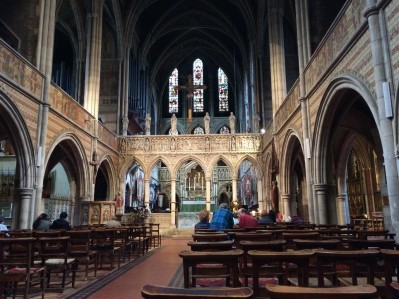By Thomas Gerity

A Fordham student studying abroad in London discovers comfort can sometimes be found outside one’s comfort zone. (Thomas Gerity/The Fordham Ram).
LONDON – Prior to my arrival in London, I was assigned to live in the northwestern neighborhood of Westburn. It is about a half an hour tube ride to the Fordham Centre campus and even further to some of the other flats that Fordham rents out for the term.
Admittedly, I was disappointed about my housing placement due to its seemingly remote location. I felt isolated from the few friends I had here in London and the inevitable vulnerability of being abroad had set in almost immediately. So I was relieved to find that the nearest Catholic church, St. Augustine’s, Kilburn, was only a 500 foot walk from my front door. I saw this convenience as a blessing.
Unofficially known as the “Cathedral of the North,” St. Augustine’s lives up to the grandeur of its title. Built in the early 1870s in the Victorian Gothic Revivalist style, the church is a splendor to behold from every angle. Its steeple rises high above every building in the area, while its interior is decorated with many arches and a variety of artistic elaborations. The minute I stepped inside, I was sold. This was going to be my church.
It became apparent to me over the course of my first mass and the tea reception afterwards that its convenience and beauty were simply additions to what was really going on. There was something different about how the parishioners were engaged in the mass and with each other.
The Gospel reading was held in the middle of the church with the congregation surrounding the priest, which implied the Word was the center of a much more human context. From my experience, the Lord has always been preached towards the crowd as opposed to spoken from the heart of the crowd. When it came time for the Sign of Peace, people did not stay in their pews and greet those immediately near them, but actively moved throughout the entire crowd to share a smile with as many people as possible. After mass, several people, including the priest, approached me with great interest about my reasons for being in London. There was a genuine feeling of warmth throughout this community that I had yet to feel in any church elsewhere.
The next Sunday, the feeling of community was just as strong. Through attending, I felt more confident about being abroad. After I told the priest that I would not be at mass for the next few weeks due to travel plans, he showed me his email address on the back of the readings booklet and told me to email him pictures of my adventures. In this place I found a community of people who cared about me.
Soon after, I discovered St. Augustine’s is an Anglo-Catholic church, as opposed to a Roman Catholic church, the religion to which I belong. The differences between the two were subtle enough to have me duped for two weeks, but clear enough in hindsight. I was disappointed because I felt the need to leave St. Augustine’s, but found great humor in the situation. I found a nearby Roman Catholic church to attend when I returned from my travels.
After a few days of consideration, I realized I had very little reason to leave St. Augustine’s. Is it technically sacrilegious to receive communion there? Sure. But to abandon a community that had so willingly welcomed me and provided me with a source of strength during a taxing transition not only seemed silly, but also unfair.
I’m not renouncing the Pope, I’m just going to spend some time with his little brother.
This whole situation was a personal demonstration of the dichotomous feelings of comfort and exploration that each study abroad student feels. In looking for a place to feel safe, I found myself in a place where I am able to explore my beliefs. I achieved this state of contrast through a willingness to connect with other individuals within the Roman Catholic Church, a process that started long before I had even considered studying abroad.
I encourage all students, but particularly those planning to study abroad, to truly connect with multiple communities and to recognize the extent of those communities in other societies. I may not have connected with the community I intended to, but a mixture of will and error has brought me to much more interesting circumstances.

Well said! More underclassman should read this!